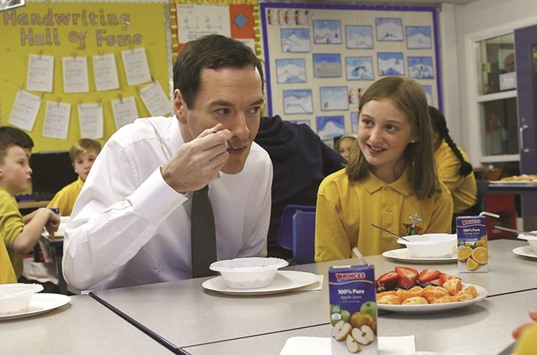Finance Minister George Osborne is running out of room to keep his centrepiece budget surplus plan on track without resorting to big tax increases or further deep spending cuts, economists said yesterday.
Osborne delivered an annual budget statement on Wednesday that maintained his target of putting Britain’s public finances back in the black by the end of the decade, despite a much weaker outlook for the economy.
His plans now look increasingly at the mercy of a further downturn in Britain’s growth prospects, which have darkened significantly in just the last few months.
“If I were the chancellor, it would be keeping me awake at night,” said Paul Johnson, director of the Institute for Fiscal Studies, a think tank that focuses on budget analysis.
The Office for Budget Responsibility blamed weak productivity - the Achilles’ heel of the economy - when it cut official growth forecasts to an average of 2.1% a year for the rest of the decade, down from an estimate of 2.4% it made as recently as November.
Johnson said there was a chance that estimate would be lowered again when the next budget update is due at the end of 2016.
“If there was another downgrade in fiscal forecasts of a similar magnitude and the chancellor did wish to remain on course... then this would surely require more real policy change,” he said.
Osborne has made the surplus target his overarching priority and used his reputation as a tough guardian on the public finances to help the Conservative Party win last year’s national election. But as the economy has slowed, the odds on Osborne becoming Britain’s next prime minister have lengthened.
On Wednesday, he said he would miss a separate fiscal goal this year and would be unable to keep public debt falling as a share of economic output.
In his efforts to remain on track with his surplus target, Osborne plans a much sharper squeeze on spending in 2019-20 than previous years as well as accounting manoeuvres such as changes to flows of corporation tax revenues.
Govt defends new sugar tax following criticism
Finance Minister George Osborne yesterday defended his plans to introduce a new sugar tax to tackle obesity, criticised as “absurd” by the soft drinks industry. There are always going to be people who will oppose these kinds of things - but I think this is going to be one of those landmark public health decisions that we take as a generation,” Osborne told ITV News. The finance minister announced the surprise measure during his annual budget on Wednesday, sparking immediate condemnation from the drinks industry. “It’s disappointing that the government has chosen to single out soft drinks,” said Jon Woods, general manager of Coca-Cola in Britain. “If the aim is to reduce obesity, this levy flies in the face of evidence from around the world which shows taxes do very little, if anything, to reduce sugar and calorie intake or obesity levels but do add to people’s cost of living,” he added. Osborne said that Britain’s childhood obesity problem was “really bad news”, and that it was “clearer and clearer that the biggest source of sugar intake has been sugary drinks”.

Chancellor of the Exchequer, George Osborne, eats with pupils during breakfast club at St Benedict’s Catholic Primary School in Garforth.
